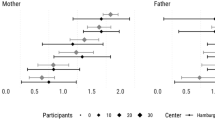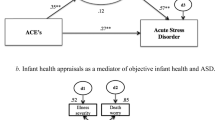Abstract
Objective
To characterize the lived experiences of stress associated with having a preterm infant hospitalized in the NICU among Black and Hispanic mothers.
Methods
We performed a qualitative content analysis of secondary data from two prior studies that included 39 in-depth interviews with Black and Hispanic mothers of preterm infants at 3 U.S. NICUs. We used a constant comparative method to select important concepts and to develop codes and subsequent themes.
Results
Black and Hispanic mothers described stressors in the following domains and categories: Individual (feeling overwhelmed, postpartum medical complications, previous stressful life events, competing priorities); Hospital (perceived poor quality of care, provider communication issues, logistical issues); Community (lack of social supports, lack of financial resources, work challenges).
Conclusions
The findings of this study suggest that stressors both inside and outside of the hospital affect the lived experiences of stress by Black and Hispanic mothers during NICU hospitalization.
This is a preview of subscription content, access via your institution
Access options
Subscribe to this journal
Receive 12 print issues and online access
$259.00 per year
only $21.58 per issue
Buy this article
- Purchase on Springer Link
- Instant access to full article PDF
Prices may be subject to local taxes which are calculated during checkout
Similar content being viewed by others
References
Martin JA, Hamilton BE, Osterman MJK, Driscoll AK. Births: Final Data for 2018. Natl Vital- Stat Rep. 2019;68:1–46.
Gondwe KW, White-Traut R, Brandon D, Pan W, Holditch-Davis D. The role of sociodemographic factors in maternal psychological distress and mother-preterm infant interactions. Res Nurs Health. 2017;40:528–40.
Greene MM, Rossman B, Patra K, Kratovil A, Khan S, Meier PP. Maternal psychological distress and visitation to the neonatal intensive care unit. Acta Paediatr. 2015;104:e306–13.
Holditch-Davis D, Santos H, Levy J, White-Traut R, O’Shea TM, Geraldo V, et al. Patterns of psychological distress in mothers of preterm infants. Infant Behav Dev. 2015;41:154–63.
Greene MM, Rossman B, Patra K, Kratovil AL, Janes JE, Meier PP. Depression, anxiety, and perinatal-specific posttraumatic distress in mothers of very low birth weight infants in the neonatal intensive care unit. J Dev Behav Pediatr. 2015;36:362–70.
Shaw RJ, Bernard RS, Deblois T, Ikuta LM, Ginzburg K, Koopman C. The relationship between acute stress disorder and posttraumatic stress disorder in the neonatal intensive care unit. Psychosomatics 2009;50:131–7.
Shaw RJ, Deblois T, Ikuta L, Ginzburg K, Fleisher B, Koopman C. Acute stress disorder among parents of infants in the neonatal intensive care nursery. Psychosomatics 2006;47:206–12.
Rogers CE, Kidokoro H, Wallendorf M, Inder TE. Identifying mothers of very preterm infants at-risk for postpartum depression and anxiety before discharge. J Perinatol 2013;33:171–6.
Lefkowitz DS, Baxt C, Evans JR. Prevalence and correlates of posttraumatic stress and postpartum depression in parents of infants in the Neonatal Intensive Care Unit (NICU). J Clin Psychol Med Settings. 2010;17:230–7.
Klawetter S, Greenfield JC, Speer SR, Brown K, Hwang SS. An integrative review: Maternal engagement in the neonatal intensive care unit and health outcomes for U.S.-born preterm infants and their parents. AIMS Public Health 2019;6:160–83.
Gerstein ED, Njoroge WFM, Paul RA, Smyser CD, Rogers CE. Maternal depression and stress in the neonatal intensive care unit: Associations with mother-child interactions at age 5 years. J Am Acad Child Adolesc Psychiatry. 2019;58:350–8 e2.
Lean RE, Rogers CE, Paul RA, Gerstein ED. NICU hospitalization: Long-term implications on parenting and child behaviors. Curr Treat Options Pediatr. 2018;4:49–69.
Lau C. The effect of stress on lactation-its significance for the preterm infant. Adv Exp Med Biol. 2002;503:91–7.
Al Maghaireh DF, Abdullah KL, Chan CM, Piaw CY, Al Kawafha MM. Systematic review of qualitative studies exploring parental experiences in the neonatal intensive care unit. J Clin Nurs. 2016;25:2745–56.
Loewenstein K, Barroso J, Phillips S. The experiences of parents in the neonatal intensive care unit: An integrative review of qualitative studies within the transactional model of stress and coping. J Perinat Neonatal Nurs. 2019;33:340–9.
Wraight CL, McCoy J, Meadow W. Beyond stress: describing the experiences of families during neonatal intensive care. Acta Paediatr. 2015;104:1012–7.
Grobman WA, Parker C, Wadhwa PD, Willinger M, Simhan H, Silver B, et al. Racial/Ethnic disparities in measures of self-reported psychosocial states and traits during pregnancy. Am J Perinatol 2016;33:1426–32.
Holditch-Davis D, Miles MS, Weaver MA, Black B, Beeber L, Thoyre S, et al. Patterns of distress in African-American mothers of preterm infants. J Dev Behav Pediatr. 2009;30:193–205.
Miles MS, Burchinal P, Holditch-Davis D, Brunssen S, Wilson SM. Perceptions of stress, worry, and support in Black and White mothers of hospitalized, medically fragile infants. J Pediatr Nurs. 2002;17:82–8.
White-Traut R, Rankin K, Fabiyi C, Liu L, Cheung I, Norr K. Maternal characteristics associated with social support in at-risk mothers of premature infants. J Obstet Gynecol Neonatal Nurs. 2017;46:824–33.
Ballantyne M, Benzies KM, Trute B. Depressive symptoms among immigrant and Canadian born mothers of preterm infants at neonatal intensive care discharge: A cross sectional study. BMC Pregnancy Childbirth. 2013;13:S11. Suppl 1
Bernardo J, Rent S, Arias-Shah A, Hoge MK, Shaw RJ. Parental stress and mental health symptoms in the NICU: Recognition and interventions. Neoreviews. 2021;22:e496–e505.
Parker MG, Lopera AM, Kalluri NS, Kistin CJ. “I Felt Like I Was a Part of Trying to Keep My Baby Alive”: Perspectives of hispanic and non-hispanic black mothers in providing milk for their very preterm infants. Breastfeed Med. 2018;13:657–65.
Parker MG, Hwang SS, Forbes ES, Colvin BN, Brown KR, Colson ER. Use of the theory of planned behavior framework to understand breastfeeding decision-making among mothers of preterm infants. Breastfeed Med. 2020;15:608–15.
Hwang SS, Parker MG, Colvin BN, Forbes ES, Brown K, Colson ER. Understanding the barriers and facilitators to safe infant sleep for mothers of preterm infants. J Perinatol. 2020:41;1992–99.
Hsieh HF, Shannon SE. Three approaches to qualitative content analysis. Qual Health Res. 2005;15:1277–88.
Ruggiano N, Perry TE. Conducting secondary analysis of qualitative data: Should we, can we, and how? Qual Soc Work. 2019;18:81–97.
Szabo V, Strang VR. Secondary analysis of qualitative data. ANS Adv Nurs Sci. 1997;20:66–74.
Hinds P, Vogel R, Clarke-Steffen L. The Possibilities and pitfalls of doing a secondary analysis of a qualitative data set. Qual Health Res. 1997;7:408–24.
Charmaz K. Premises, principles, and practices in qualitative research: revisiting the foundations. Qual Health Res. 2004;14:976–93.
Boeije H. A purposeful approach to the constant comparative method in the analysis of qualitative interviews. Qual Quant. 2002;36:391–409.
Loewenstein K. Parent psychological distress in the neonatal intensive care unit within the context of the social ecological model: A scoping review. J Am Psychiatr Nurses Assoc. 2018;24:495–509.
Golden SD, McLeroy KR, Green LW, Earp JA, Lieberman LD. Upending the social ecological model to guide health promotion efforts toward policy and environmental change. Health Educ Behav. 2015;42:8S–14S. 1 Suppl.
McLeroy KR, Bibeau D, Steckler A, Glanz K. An ecological perspective on health promotion programs. Health Educ Q. 1988;15:351–77.
Miles MS, Funk SG, Carlson J. Parental Stressor Scale: Neonatal Intensive Care Unit. Nurs Res. 1993;42:148–52.
Beck AF, Edwards EM, Horbar JD, Howell EA, McCormick MC, Pursley DM. The color of health: How racism, segregation, and inequality affect the health and well-being of preterm infants and their families. Pediatr Res. 2019;87:227–34.
Reichman V, Brachio SS, Madu CR, Montoya-Williams D, Pena MM. Using rising tides to lift all boats: Equity-focused quality improvement as a tool to reduce neonatal health disparities. Semin Fetal Neonatal Med. 2021;26:101198.
Parker MG, Garg A, McConnell MA. Addressing childhood poverty in pediatric clinical settings: The neonatal intensive care unit is a missed opportunity. JAMA Pediatr. 2020;174:1135–36.
Riddell CA, Harper S, Kaufman JS. Trends in differences in us mortality rates between Black and White infants. JAMA Pediatr. 2017;171:911–3.
Dominguez TP, Dunkel-Schetter C, Glynn LM, Hobel C, Sandman CA. Racial differences in birth outcomes: The role of general, pregnancy, and racism stress. Health Psychol. 2008;27:194–203.
Lu MC, Kotelchuck M, Hogan V, Jones L, Wright K, Halfon N. Closing the Black-White gap in birth outcomes: A life-course approach. Ethn Dis. 2010;20:62–76. (1 Suppl 2):S2.
Gadson A, Akpovi E, Mehta PK. Exploring the social determinants of racial/ethnic disparities in prenatal care utilization and maternal outcome. Semin Perinatol. 2017;41:308–17.
Tamir C BA, Noe-Bustamante L, Mora L. Facts about the U.S. Black population. Pew Research Center, Washington, DC. (March 25, 2021) https://www.pewresearch.org/social-trends/fact-sheet/facts-about-the-us-black-population/?menuItem=f4a5972a-65b9-4634-8e1e-5ec2d5dabc16#population-growth.
Acknowledgements
The mothers who have generously shared their time and stories with us and their families.
Funding
1. Qualitative Study of Breastfeeding Non-Hispanic Black and Hispanic Mothers with Very Low Birthweight Infants >2 months of age in Massachusetts, WK Kellogg Foundation # P3031871 (PI Parker). 2. Study of Attitudes and Factors Effecting PREterm infant care Practices (SAFE PREP), Eunice Kennedy Shriver National Institute for Child Health and Development #1R01HD095060-01 (PI Parker/Hwang).
Author information
Authors and Affiliations
Contributions
In addition to all authors agreeing to be accountable for all aspects of the work and approving the final version of the manuscript: Witt conceptualized and designed the study, coordinated and carried out analyses, drafted the initial manuscript, and reviewed and revised the manuscript. Colson conceptualized and designed the study, designed the data collection instruments, collected data, carried out analyses, reviewed and revised the manuscript. Colvin, Parker, Hwang, and Forbes designed the data collection instruments, collected data, carried out analyses, and reviewed and revised the manuscript. Lenze carried out analyses, reviewed and revised the manuscript. Rogers carried out analyses, reviewed and revised the manuscript.
Corresponding author
Ethics declarations
Competing interests
The authors declare no competing interests. This study was performed in accordance with the declaration of Helsinki and was approved by the Washington University Institutional Review Board (IRB). Informed consent was obtained from all subjects.
Additional information
Publisher’s note Springer Nature remains neutral with regard to jurisdictional claims in published maps and institutional affiliations.
Rights and permissions
About this article
Cite this article
Witt, R.E., Colvin, B.N., Lenze, S.N. et al. Lived experiences of stress of Black and Hispanic mothers during hospitalization of preterm infants in neonatal intensive care units. J Perinatol 42, 195–201 (2022). https://doi.org/10.1038/s41372-021-01241-0
Received:
Revised:
Accepted:
Published:
Issue Date:
DOI: https://doi.org/10.1038/s41372-021-01241-0
This article is cited by
-
Equity, inclusion and cultural humility: contemporizing the neonatal intensive care unit family-centered care model
Journal of Perinatology (2024)
-
Understanding the Domains of Experiences of Black Mothers with Preterm Infants in the United States: A Systematic Literature Review
Journal of Racial and Ethnic Health Disparities (2023)



